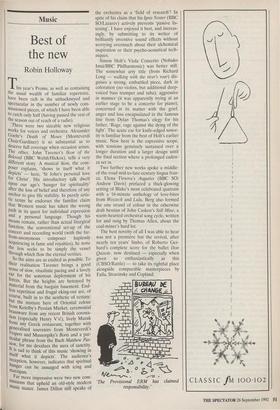Music
Best of the new
Robin Holloway
This year's Proms, as well as containing the usual wealth of familiar repertoire, have been rich in the unhackneyed and spectacular in the number of newly com- missioned pieces, of which I have been able to catch only half (having passed the rest of the season out of reach of a radio). There were two sizeable new religious works for voices and orchestra. Alexander Goehr's Death of Moses (Monteverdi Choir/Gardiner) is so substantial as to deserve full coverage when occasion arises. The other, John Tavener's Ikon of the Beloved (BBC Welsh/Hickox), tells a very different story. A musical ikon, the com- poser explains, 'shows in itself what it depicts' — here, 'St John's personal love for Christ'. His introductory talk dwelt upon our age's 'hunger for spirituality' after the loss of belief and therefore of any anchor to give life stability. In purely artis- tic terms he endorses the familiar claim that Western music has taken the wrong path in its quest for individual expression and a personal language. Though his means remain, rather than actual liturgical function, the conventional set-up of the concert and recording world (with the far- from-anonymous composer haplessly acquiescing in fame and royalties), he none the less seeks to be simply the vessel through which flow the eternal verities.
So the aims are as exalted as possible. To their realisation Tavener brings a good sense of slow, ritualistic pacing and a lovely ear for the sonorous deployment of his forces. But the heights are betrayed by Material from the bargain basement. End- less repetition and frugal eking-out are, of course, built in to the aesthetic of ecstasy; but the mixture here of Oriental colour ,from Ketelby's Persian Market, ceremonial brass ware from any recent British corona-
tion (especially Henry V's!), lively Muzak from any Greek restaurant, together with generalised souvenirs from Monteverdi's Vespers and Mussorgsky's Boris and a par- ticular phrase from the Bach Matthew Pas- sirm. , for me devalues the aura of sanctity. It is sad to think of this music 'showing in itself what it depicts'. The audiences reception, however, indicates that spiritual hunger can be assuaged with icing and Marzipan.
Far more impressive were two new com- missions that upheld an old-style modern Music stance. James Dillon still speaks of the orchestra as a 'field of research'! In spite of his claim that his Ignis Noster (BBC SO/Lazarev) actively prevents 'passive lis- tening', I have enjoyed it best, and increas- ingly, by submitting to its welter of brilliantly inventive sound effects without worrying overmuch about their alchemical inspiration or their psycho-acoustical tech- niques.
Simon Holt's Viola Concerto (Nobuko Imai/BBC Philharmonic) was better still. The somewhat arty title (from Richard Long — walking with the river's roar) dis- guises a strong, embattled piece, dark in coloration (no violins, but additional deep- voiced bass trumpet and tuba), aggressive in manner (it was apparently trying at an earlier stage to be a concerto for piano), concerned in its matter with the grief, anger and loss encapsulated in the famous line from Dylan Thomas's elegy for his father, 'Rage, rage against the dying of the light'. The acute ear for knife-edged sonor- ity is familiar from the best of Holt's earlier music. New here is the expressive scope, with tensions genuinely sustained over a longer duration and a larger design until the final section where a prolonged caden- za set in.
Two further new works spoke a middle- of-the-road mid-to-late-century lingua fran- ca. Elena Firsova's Auguries (BBC SO/ Andrew Davis) prefaced a thick-glowing setting of Blake's most celebrated quatrain with a 16-minute anthology of love-bites from Wozzeck and Lulu. Berg also formed the one strand of colour in the otherwise drab hessian of John Casken's Still Mine, a warm-hearted orchestral song cycle, written for and sung by Thomas Allen, about the coal-miner's hard lot.
The best novelty of all I was able to hear was not a premiere but the revival, after nearly ten years' limbo, of Roberto Ger- hard's complete score for the ballet Don Quixote, now destined — especially when given so enthusiastically as this (CBSO/Rattle) — to take its rightful place alongside comparable masterpieces by Falla, Stravinsky and Copland.
The Provisional ERM has claimed responsibility.'


































































 Previous page
Previous page